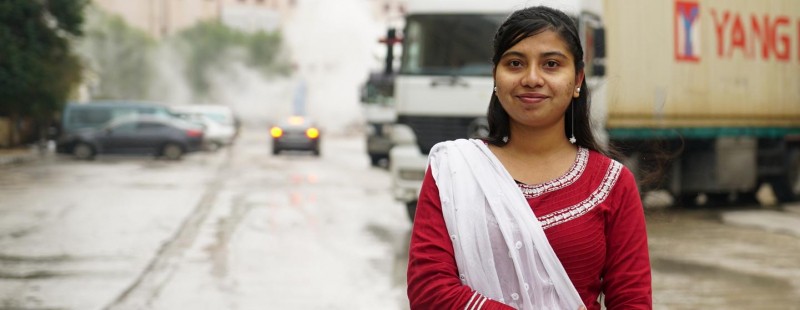Contents
A portrait of Maya Aktar, from Bangladesh, who represents migrant workers in Jordan’s garment sector. Maya Aktar, a garment worker from Bangladesh, represents other migrants employed in the sector, in Jordan. She explains how she became involved in the union movement, and the positive difference this has made to the lives of her members. “I left my home in Bangladesh for a job at a garment factory in Jordan six years ago, I had no idea what the future would hold. But I took an unexpected step that changed my life. I was 19. My father owned a small fruit shop in Dhaka and my mother worked at home sewing and selling clothes. There are six of us in the family. We could hardly make ends meet. I thought that I could support the family financially by working in Jordan. I also hoped to save money to go to university. The first time I went, I worked as a receptionist at a factory in Irbid. When I returned home after my contract ended, I found out that my father had cancer and that our family’s financial problems had worsened. In addition to my native language, Bangla, I am fluent in Hindi and in English. So when I went back to Jordan I worked as a liaison officer at a garment factory in Sahab, assisting management and workers to communicate better. Maya Aktar eating with migrant workers. One day, I met Mr. Arshad, who was an organizer in the General Trade Union of Workers in Textile, Garment, and Clothing Industries. He explained what a union organizer does. I told Mr. Arshad that it would be a dream come true for me to get the chance to help champion other workers and speak up on behalf of those who cannot. To my surprise, Mr. Arshad reached out to me a few months later, asking if I was interested in the position. I agreed. It was liberating. I was like a fish who had been living in a pond and had moved to a river. I was so honoured to be able to represent migrant workers. Being multilingual and a good communicator has enabled me to represent and help many workers who only speak their native languages. I started my work as a union organizer in November 2020. One of my top priorities was to identify the issues that migrant workers faced and find solutions through open lines of communication with garment factory management. Arranging meetings with workers was a challenge at first because of their long work hours. Many also hesitated to open up, even to a representative from Bangladesh. Some were afraid of losing their jobs and had managers that had advised them against cooperating with union organizers because they thought we would cause problems. But I was determined to ensure these workers would get their voices heard. I promised them anonymity and met with them outside of their workplaces to help them feel comfortable enough to express themselves Some workers do not know how to present their complaints, and others avoid talking about their problems for fear of punishment or losing their jobs. Some workers, for instance, had been kept on by their employers after their contract ended, but then lost the right to a plane ticket home, or an end of contract bonus. Others have come to me about experiences of sexual harassment. Some reported delays in receiving their salaries or arguments they have had with their supervisors. Maya regularly sends money home to help support her family in Bangladesh. Most workers from Bangladesh, Sri Lanka, India and other countries do not speak or read Arabic or English. When instructions, announcements, and financial documents are in these languages, it can create problems for workers. Being multilingual and a good communicator has enabled me to represent and help many workers. I feel proud to be able to help them overcome these language barriers. I have also taken part in different training programmes run by Better Work Jordan, covering issues such as sexual harassment in the workplace, effective communication, personal hygiene, collective bargaining, working conditions, and labour laws. These trainings have positioned me to be an even better advocate for women and migrant workers. Helping and empowering migrant workers has been one of the most rewarding experiences of my life. Under COVID-19 restrictions, I could not hold in-person meetings with workers and had to rely on telephone calls to see how the workers were doing. During the lockdown, many workers wanted to return to their countries but could not travel because the airport was shut down. I had to explain the difficult situation and offer counsel to these workers, who often remained stranded in Jordan. Helping and empowering migrant workers has been one of the most rewarding experiences of my life. Being able to act as their representative gives me a sense of purpose and motivates me to keep moving forward. I am also happy to be able to continue to send money back to my family in Bangladesh and feel pride in my representation of other Bengali people. I plan to become a trainer so I can help migrant workers even more. I also want to do a degree in psychology, which will help me understand people better. I think that my success in becoming a union organizer is a success for all of us who are migrant workers in Jordan.” A version of this story first appeared on the website of our colleagues at the International Labour Organisation (ILO).
From a pond to a river
A bridge between workers and management

Looking ahead
Improving conditions for garment workers



